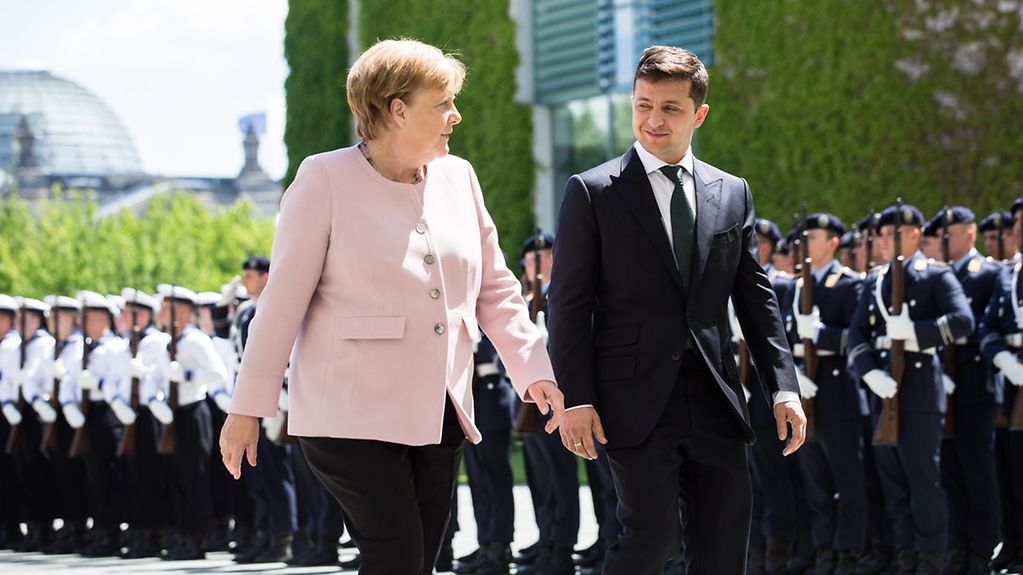Inaugural visit of Volodymyr Zelensky in Berlin
"We would like to support Ukraine on its way to positive economic and democratic development," said Chancellor Angela Merkel following her meeting with President Volodymyr Zelensky at the Federal Chancellery. The implementation of the Minsk agreements was one important issue discussed.
2 min reading time

The Chancellor welcomed Ukraine's President Volodymyr Zelensky with military honours
Photo: Bundesregierung/Steins
Ukraine’s President Volodymyr Zelensky paid his inaugural visit to Chancellor Angela Merkel, who welcomed him with military honours at the Federal Chancellery. The 41-year-old took office as President of Ukraine on 20 May 2019, having been elected for a five-year term of office. During his visit to Germany, the new Ukrainian head of state will also meet with Federal President Frank-Walter Steinmeier.
Ukraine lies in Eastern Europe and is home to a good 42 million people. The former Soviet Republic became independent in 1991. It borders on Russia, Belarus, Poland, Slovakia, Hungary, Romania and Moldova. With a landmass of 603,700 square kilometres, Ukraine is the largest purely European country. Some 2.9 million people live in the capital, Kyiv.
A course for reform under difficult circumstances
With a view to the war in eastern Ukraine and the Russian annexation of Crimea, Angela Merkel spoke of "very, very difficult circumstances" surrounding the path that Ukraine has already taken towards reform. "We welcome the steps towards reform and we realise that this is no easy path."
Since 2014, Germany has invested more than half a billion euros in development in Ukraine, Angela Merkel continued. "We want to see the country making progress in the areas that are important for the future, such as infrastructure, promotion of education and cutting-edge research." Projects initiated in recent years, such as decentralising Ukraine, should be continued, she said.
Restoring Ukraine’s sovereignty
The Chancellor also commented on the conflict with Russia in eastern Ukraine and Crimea. The Minsk agreements provide the framework for restoring the sovereignty and territorial integrity of Ukraine, she stated.
Volodymyr Zelensky and the Chancellor were in agreement "that until progress has been made, sanctions on Russia cannot be lifted," stressed Angela Merkel. Germany will continue to do everything in its power to resolve the conflict .
In March 2014 Russia illegally annexed Crimea, a peninsula belonging to Ukraine. It is still supporting armed separatists in the east of Ukraine (around Donetsk and Luhansk). Germany is involved in efforts to resolve the conflict within the scope of the Minsk agreements and is also part of what is known as the Normandy group (with France, Ukraine and Russia), with the goal of restoring the territorial integrity and sovereignty of Ukraine.